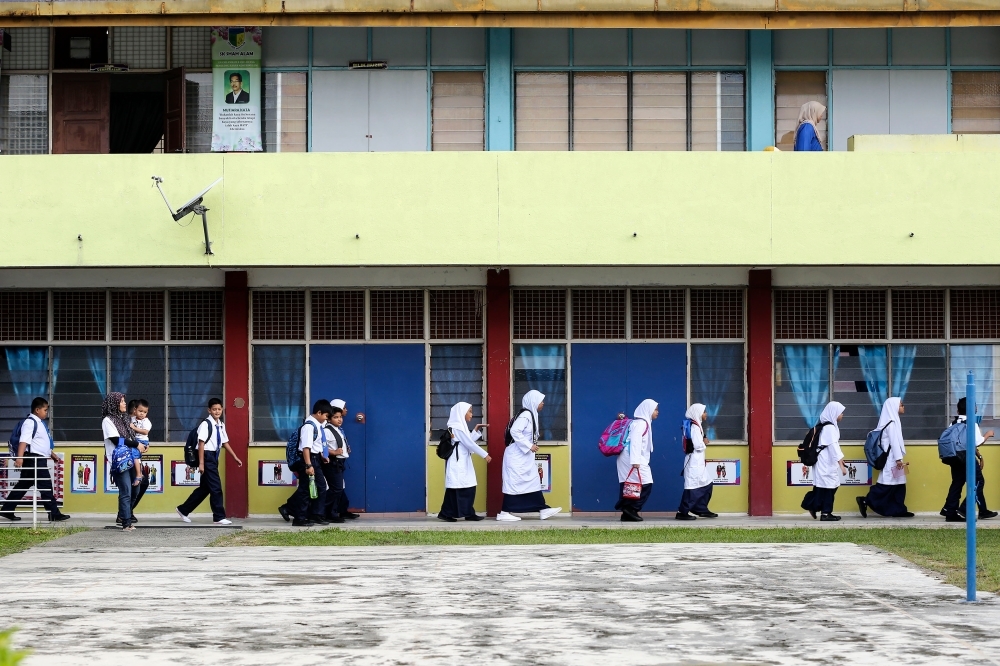
After PM Anwar’s push for English, Page urges education minister to review DLP curbs

The organisation argued that instead of limiting access to DLP, schools should offer more Bahasa Melayu immersion programmes to support students who may struggle with the language. — Picture by Yusof Mat Isa
Thursday, 13 Feb 2025 5:20 PM MYT
KUALA LUMPUR, Feb 13 — Education advocacy group Parent Action Group for Education (Page) has called on the government to expand the Dual Language Programme (DLP) instead of restricting it, warning that limitations could hinder Malaysia’s economic progress and the country’s ambition to strengthen English proficiency.
Page chairperson Datin Noor Azimah Abdul Rahim issued the statement today, responding to Prime Minister Datuk Seri Anwar Ibrahim’s recent call for stronger English proficiency and faster education reforms.
Anwar had urged the Ministry of Education to improve execution or risk economic setbacks.
Noor Azimah highlighted that Sarawak has made significant strides in education reforms under the Malaysia Agreement 1963, particularly in its commitment to the DLP.
“Sabah has also shown determination, albeit with a less aggressive approach, while Johor has recently taken steps to assert control over its English language education policies,” read the statement.
However, she noted that parents in Peninsular Malaysia are frustrated by what they see as inconsistent policies.
“Parents in Peninsula are bewildered as to how Sarawak, Sabah and now Johor are able to disagree with Putrajaya yet progressive parents who want DLP for their children instead are confronted with the police and Special Branch on the instruction of school principals,” she said in the statement.
“We must establish a Malaysian identity rather than have Putrajaya impose one dominant culture on us,” she said. “Diversity is our strength.”
The group also raised concerns over the English Language Teaching Centre’s ability to effectively manage various English proficiency initiatives, including the Highly Immersive Programme, the DLP, the Common European Framework of Reference (CEFR), Pre-School English education, the Teaching of English as a Second Language (TESL), Continuing Professional Development (CPD), and teacher upskilling programmes, all of which require significant funding.
“Parents want to know specifically how DLP is going to be expanded in terms of the number of schools, new schools, number of students and number of classes.
“The Minister of Education herself has guaranteed that there is an adequate number of science and mathematics teachers to teach these subjects in the English language.
“Parents in primary and secondary schools are aghast that the number of DLP classes has been reduced when there is a demand for more to open. These are young, progressive parents who are disappointed with principals and school leaders who are complacent, lack dynamism, and exhibit a backward attitude towards economic growth, vision, and purpose of education. The dangling carrot should be lucrative scholarships, which are not impossible to attain.”
Page also urged Education Minister Fadhlina Sidek to reconsider the DLP guidelines introduced on March 19, 2024, which require at least one mandatory non-DLP class in schools.
The organisation argued that instead of limiting access to DLP, schools should offer more Bahasa Melayu immersion programmes to support students who may struggle with the language.
“The most important question is, who is monitoring and ensuring that these programmes are being supported rather than sabotaged?” Noor Azimah asked.
“The Minister should not cannibalise the programmes already in place with the excuse that there are inadequate resources or that it was someone else’s legacy.”
No comments:
Post a Comment